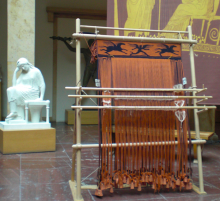Andromache Karanika is Chair and Associate Professor of Classics in the University of California at Irvine. Her visit to UW is jointly hosted by Classics and by the Hellenic Studies Program in the Jackson School.
Prof. Karanika writes: Textile activity is often regarded as a signifier of feminine notions of time. This paper traces different scenes from early, classical, Hellenistic and Byzantine literature in which weaving becomes a ‘material’ marker of temporal ruptures and continuities. Textiles are pliable objects that do not change but only cover the form of body or other space. They can become a second ‘fake’ skin, a mask, and mold of the body, but, also what the eyes perceive as true skin, as the mediator of the gaze and body. They also become a material and mobile stamp on temporal perceptions for individuals and communities as they can be passed from one place or time to another. With a theoretical view from the anthropology of the senses this paper analyzes how references to weaving and loom are not simply spatial pillars in narratives but also complex temporal markers engaging different senses.
